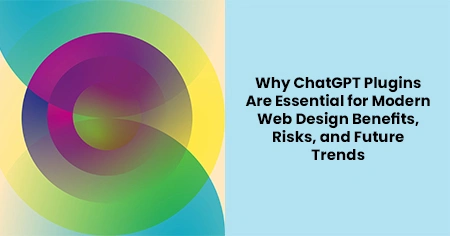It would be foolish to rehash the power of ChatGPT in a thousand separate publications. Anyone with an online connection recognizes that ChatGPT is transforming how we utilize and perceive artificial intelligence. In reality, the site attracts over 25 million visitors per day.
ChatGPT is mainly used as an alternative to human copywriters--a divine comedy in the works--, but only some people recognize how valuable the platform is in web design.
Plugins improve the functionality of ChatGPT. They include a variety of capabilities that can help with development work.
However, like any technology, they come with benefits, risks, and emerging trends. This article will explain why chatGPT plugins Are essential for modern web design and delve into their future trends, benefits, and risks.
What is ChatGPT?

ChatGPT is a sophisticated AI designed to understand and generate text. It uses advanced machine-learning techniques to engage in conversation.
ChatGPT provides developers a platform to automate coding activities and simplify problem solutions. It can be used for various tasks, including code generation and debugging. Its adaptability makes it an indispensable tool in current software development.
The Role of Plugins in Enhancing ChatGPT
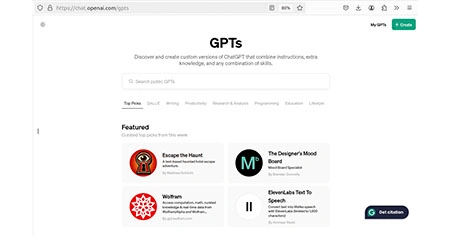
Plugins enhance ChatGPT's capabilities. They enable users to personalize ChatGPT based on their tastes and special needs.
Plugins enable web design agencies to automate operations, integrate with other tools, and improve the user experience. They add layers of new features to ChatGPT, making it more useful in various circumstances.
Essentially, plugins allow developers to maximize ChatGPT. Developers can turn ChatGPT into a personalized, productivity-boosting assistant by selecting the appropriate ones.
Benefits of ChatGPT Plugins in Web Design
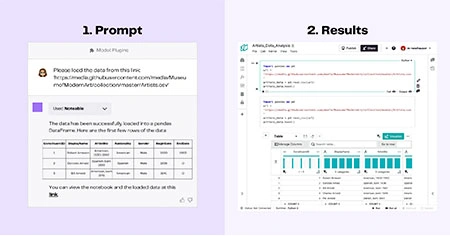
So, without further ado, here are the benefits of using ChatGPT in web design New Jersey.
Write WordPress plugins
While WordPress has over 58,000 free plugins, they may only cover some events and feature requirements. With the appropriate technological skills, new plugins can be produced on an open-source platform. But what if you need more technical knowledge?
ChatGPT can generate WordPress web pages based on user input. However, in addition to providing the code needed to operate the plugin, ChatGPT can also provide step-by-step instructions on installing your code in WordPress.
So, whether you're a beginner web design company or a pro trying to save time, ChatGPT is a valuable tool.
Write HTML and CSS
You may prefer to design your website yourself rather than using WordPress. ChatGPT can also help with this by creating HTML and CSS codes. Once again, some technical knowledge will be required to compile the code successfully, although ChatGPT can provide instructions.
In addition to providing HTML and CSS code, ChatGPT can advise on website design concepts and best practices to guarantee that your website is functional, visually beautiful, and user-friendly.
Debug code
It's simple to make a few blunders when coding, whether you're a beginner or an expert. Fortunately, users can run code snippets through ChatGPT, revealing obvious logical and grammatical issues. Of course, debugging code using ChatGPT is not flawless, and human testing is still required, but it adds an extra layer of testing, giving you peace of mind.
Furthermore, ChatGPT's ability to detect problems quickly and accurately can save developers time and effort, freeing them up to work on more sophisticated coding jobs. Its machine-learning capabilities also allow it to learn from previous faults and increase its error detection accuracy.
Generate metadata
Once your website has been developed, you must attract visitors.
ChatGPT accomplishes this by creating metadata, such as page titles and descriptions, which appear in search results. The more streamlined your metadata is, the more likely web users will click through to your site.
In addition to providing metadata, ChatGPT can help with search engine optimization (SEO) by recommending keywords and improving content. By implementing these tactics, you can increase your website's exposure in search engine results and attract more visitors.
Drawbacks and Limitations
While plugins can help to improve LLMs' existing capabilities, they also have drawbacks and restrictions. Here are the most significant limits I encountered while utilizing the ChatGPT plugins:
Plugins are slow: For simple use cases, such as seeking real-time information, it may still be quicker to use a search engine.
Plugins can still cause hallucinations. Hallucinations may be decreased, but remember that the underlying LLM behind ChatGPT can continue to hallucinate.
Plugins disclose more of your personal information: To profit from using LLMs with your data, you must first expose it to the plugin. Read their data privacy rules before integrating any plugins with personal data, documents, or your email account.
Plugins can be brittle: Because they rely on external APIs, a plugin can be rendered almost worthless if an API fails or doesn't work correctly. This happened to me several times.
When you click on the dropdown menu for the plugin used to elicit your reaction, you'll notice that some plugins are relatively easy. For example, when using the ScholarAI plugin to find articles, it extracts a search query with simple parameters from the prompt and searches a database.
Plugins lack human judgment: ChatGPT's Browsing Mode and other plugins that connect users to real-time data search the Internet for us, essentially "clicking" on links and scanning web pages for important information. However, this cannot replace human judgment since we need to understand the decision-making process used to select or rank sources.
Risks of ChatGPT Plugins in Web Design
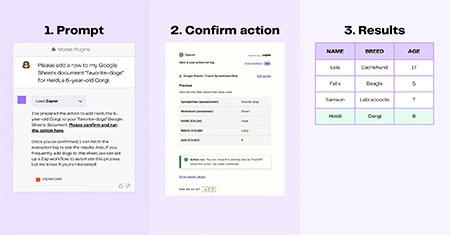
Risks of ChatGPT
- ChatGPT plugins process user data, which could be vulnerable to breaches if not properly secured.
- Failing to adhere to GDPR, CCPA, or other data protection regulations can lead to legal challenges.
Overreliance on AI
- Excessive use of AI-generated content can lead to generic web designs that need more originality.
- Plugins may unintentionally perpetuate biases in responses or content.
Technical Limitations
- Ensuring compatibility with existing CMS or frameworks can be complex.
- Reliance on cloud-based AI plugins may lead to disruptions during outages or maintenance.
User Experience Risks
- Too much automation can frustrate users seeking human interaction.
- Misunderstanding user intent can lead to inappropriate or irrelevant responses.
What Does the Future of ChatGPT Look Like?
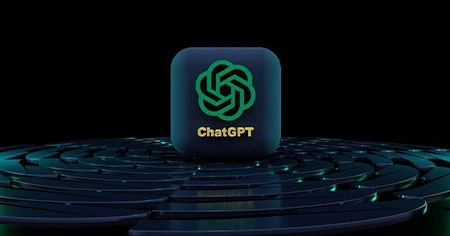
ChatGPT has skyrocketed in popularity, ready to transform and impact practically every industry, from education to the job market to business to our everyday lives. With its fundamental purpose and potential of automating repetitive processes, delivering real-time data analysis, and many other features, ChatGPT's future will likely be revolutionary, transforming how resources and time are spent. ChatGPT's destiny is determined mainly by its ultimate purpose. From creating answers to existential commonplace problems to writing code to offering outstanding responses, the future of AI is here. ChatGPT is regarded as a disruptive breakthrough, comparable to Google ushering in significantly more sophisticated and remarkable tasks regarding writing answers, essays, emails, or letters.
As a result, one of the most major changes in ChatGPT's future will be a shift in user behavior as they increasingly migrate to ChatGPT rather than Google or other search engines. ChatGPT's future is projected to be marked by ongoing research and development, as well as increased integration into a variety of platforms and applications. The biggest enhancements to ChatGPT in the future would be to improve language generation and make it more accessible and user-friendly for a wide range of applications.
Future Trends in ChatGPT Plugins for Web Design

Advanced Personalization
- Future plugins will use AI to predict user preferences with even greater accuracy.
- They will analyze browsing patterns to provide dynamic content suggestions in real time.
Multimodal Capabilities
- Plugins will support complex interactions, such as generating multimedia content.
- Users will interact with websites via voice, creating more intuitive experiences.
Seamless Integration with IoT
- ChatGPT plugins will connect seamlessly with IoT devices for enhanced user interaction.
- They will provide consistent experiences across desktops, mobiles, and smart devices.
Ethical and Secure AI
- Plugins will prioritize transparency in data usage and decision-making.
- Future advancements will include robust encryption and better compliance mechanisms.
Collaboration Tools
- Designers and web design agencies will use ChatGPT plugins as collaborative brainstorming and project management tools.
- Insights will be shared seamlessly across teams for informed decision-making.




